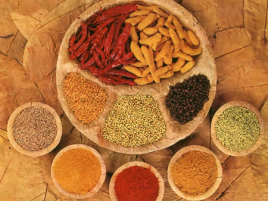Culinary Spices Can Help Lower Triglyceride Levels
By Tara Green | Сен 22, 2011

(NaturalNews) Adding enough of the right kind of spices to your food can partially offset the negative health impact of a high-fat meal, according to a recent study published in The Journal of Nutrition. Sheila West, PhD, associate professor of bio-behavioral health at Penn State University and lead researcher for the study, stated that “Antioxidants like spices may be important in reducing oxidative stress and thus reducing the risk of chronic disease.”
Researchers looked at the effects of spices in the post-meal metabolic markers of six healthy but overweight male volunteers, 30-65 years old. “Normally, when you eat a high-fat meal, you end up with high levels of triglycerides, a type of fat, in your blood,” West noted.
“If this happens too frequently, or if triglyceride levels are raised too much, your risk of heart disease is increased.” The research team wanted to determine whether adding proven anti-oxidant spices to a meal protected volunteers from some of effects of eating a high-fat meal.
“In the spiced meal, we used rosemary, oregano, cinnamon, turmeric, black pepper, cloves, garlic powder and paprika,” said Ann Skulas-Ray, a postdoctoral candidate at Penn State who was one of the research team. “We selected these spices because they had potent antioxidant activity previously under controlled conditions in the lab.” The researchers estimated the spices provided antioxidants roughly equivalent to a glass of red wine or an ounce and a half of dark chocolate.
First, the men were served a control meal consisting of bland foods. The following week they ate a meal of similar caloric and fat content but prepared with the anti-oxidant spices.
Researchers sampled study participants blood prior to each meal and at 30-minute intervals for 3.5 hours afterward. Analysis of the blood samples showed lower insulin and triglyceride levels after the spicy meal compared with postprandial blood insulin and triglyceride levels after the first meal.
The spices had a significant effect: a 31% drop in triglycerides and 21% for insulin. The glucose levels were similar after both meals. The overall antioxidant activity in the blood increased by 13% after the meal prepared with spices.
The researchers point out that the study findings about the spices appear consistent with effects seen with tea, also known for its antioxidant benefits. They theorize that the mechanisms involved in the improved antioxidant levels after the spicy meal may include delayed gastric emptying and direct inhibition of pancreatic lipases.
Both meals in the study contained 1,200 calories. Study participants reported similar satisfaction levels with both meals, and no gastrointestinal effects from the spicier meal. The second meal contained a total of two tablespoons of spices.
West plans another study to determine whether smaller amounts of spice offer similar protective benefits. The researchers also hope in future to analyze the specific, separate effects of each of the spices used in the study. The initial study discussed in The Journal of Nutrition was limited because of the small number of volunteers and lack of diversity among the sample population, factors which future studies can correct.
Learn more: http://www.naturalnews.com/033636_culinary_spices_triglycerides.html#ixzz1YgfC87h6















